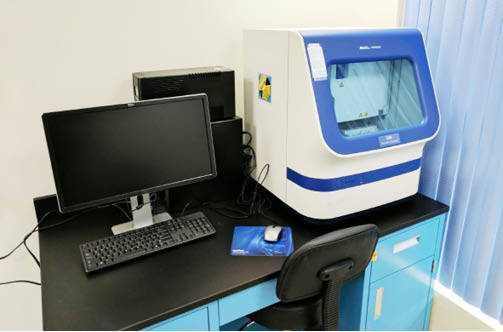How the Lagos DNA centre will help reduce crime
If a rapist knows that his semen can be screened on his victim and that could lead him to jail, maybe the number of rape cases would be reduced. If women who have three children for three fathers know the DNA analyses on those children will eventually expose their shenanigans and send them packing from […]


If a rapist knows that his semen can be screened on his victim and that could lead him to jail, maybe the number of rape cases would be reduced.
If women who have three children for three fathers know the DNA analyses on those children will eventually expose their shenanigans and send them packing from their matrimonial homes, maybe the number of illegitimate children in many homes will be minimal. And if a thief, kidnapper or assassin is aware that his sweat, blood and hair can be used to track him, as well as be a piece of evidence against him in a law court, there is a likelihood that the incidence of crime will be reduced to the barest minimum in Nigeria.
Such is the power of technology, and the importance of the Forensic DNA Centre that the Lagos State government has built and equipped.
In September 2017, the Lagos State government commissioned the centre to assist the Ministry of Justice and other government parastatals, as well as the police in crime detection and reduction.
To a passer-by, the building, located at 48/50, Odunlami Street, opposite the Bookshop House Lagos Island, is not operational due to the pin-drop silence in the premises. However, the facility, as the Daily Trust reporter who visited there discovered, has actually been operational, with the staff working round the clock to ensure that samples brought in are worked on.
What do they really do there, many would wonder? Shelley Johnson, the technical leader at the centre, revealed there are three major analysis and tests done at the centre: the STR analysis, Ystrad analysis and a biological relationship testing for determining kinship.
Dr Richard Somiari, the centre’s director, also explained that the staff work on DNA profiles obtained from biological materials at forensic crime scenes, missing persons, unidentified persons, mass disasters, offenders, and families of missing and unidentified persons to determine if a particular DNA sample matches or exists among the evidence.
Somiari further explained that at the centre, evidence can be provided to support forensic investigations, as well as for the identification of suspects involved with a crime.
On how long it takes before results of taken samples can be ready, Somiari stated that a large number of samples take time to be analysed. Some results can take weeks, while others can be ready within a few days or in two hours. “It all depends on the nature of the case,” he said.
Johnson, an expert in forensic and DNA analysis boasting 22 years’ experience, said the centre was equipped to analyse specimens that include blood, bloodstains, bone, fingernails, hair roots, saliva, semen, vaginal secretions, urine, and a whole lot more.
With her over two decades experience in the field of forensic DNA analysis, Johnson regarded the centre as fully equipped with high standard, state-of-the-art equipment. “The pieces of equipment in the laboratory so far are numerous and are all working already,” she said.
On payment method, she informed that the centre accepts any of the major currencies – naira, dollar or euros. Asides cash, there is a point-of-sale system and clients can as well pay through bank cheques. She revealed that the centre was working on how people can pay online at the centre’s website.
Johnson said when necessary, LSD&FC can send a kit for DNA collection to a different location, including remote areas if circumstances could not allow the parties involved to visit the centre for submission of the sample. That is how they collect samples outside the premises.
During the commissioning of the building in September, the state’s Attorney-General and Commissioner for Justice, Mr Adeniji Kazeem, said the centre would assist the state to have a reliable DNA database to enable investigators and law enforcement officers identify crime patterns and suspects, and also help exonerate or convict suspects.
Lagos State governor Akinwumi Ambode said government would soon move to the second stage of building additional capacity in the areas of firearms, ballistics, fingerprint, and tool marks; digital forensics and questioned documents examination.
According to him, “The development of these other forensic sections at the facility will complement the DNA forensic section and enhance the level of services offered at the moment.”
Ambode also said the centre was built to resolve all forms of crimes, paternity issues and others through technology, which he said was the modern trend across the world.
With the strong belief of the state government that the centre can help reduce crime, the governor said, “I am convinced that the establishment of the Lagos DNA & Forensic Centre will improve the speed and quality of evidence collected to assist our courts in the quick dispensation of justice. This centre is a definite boost for our administration’s justice sector reform programme. The DNA Centre is another move to demonstrate the state government’s resolve to stay ahead of criminals through scientific-led investigations.”
